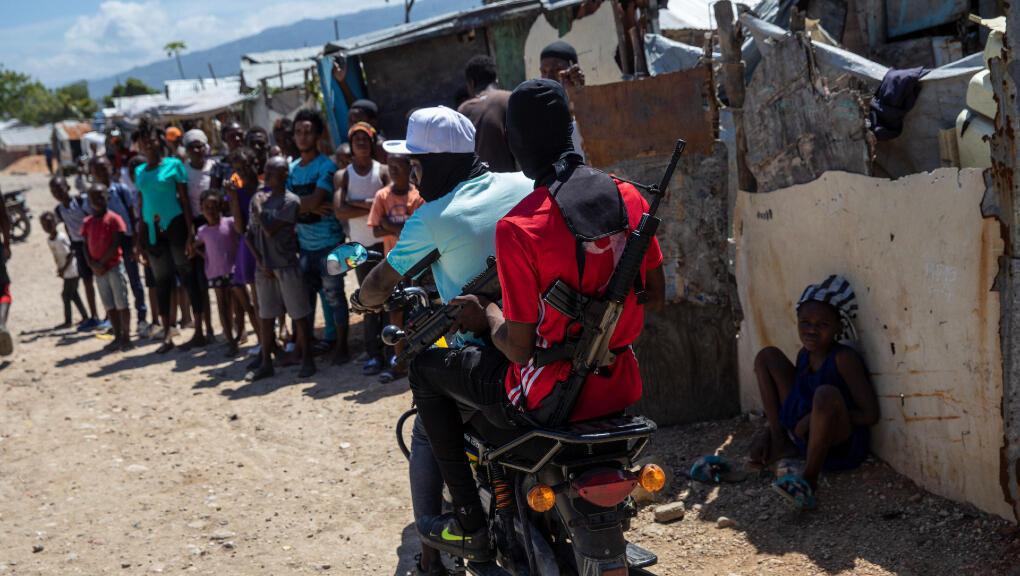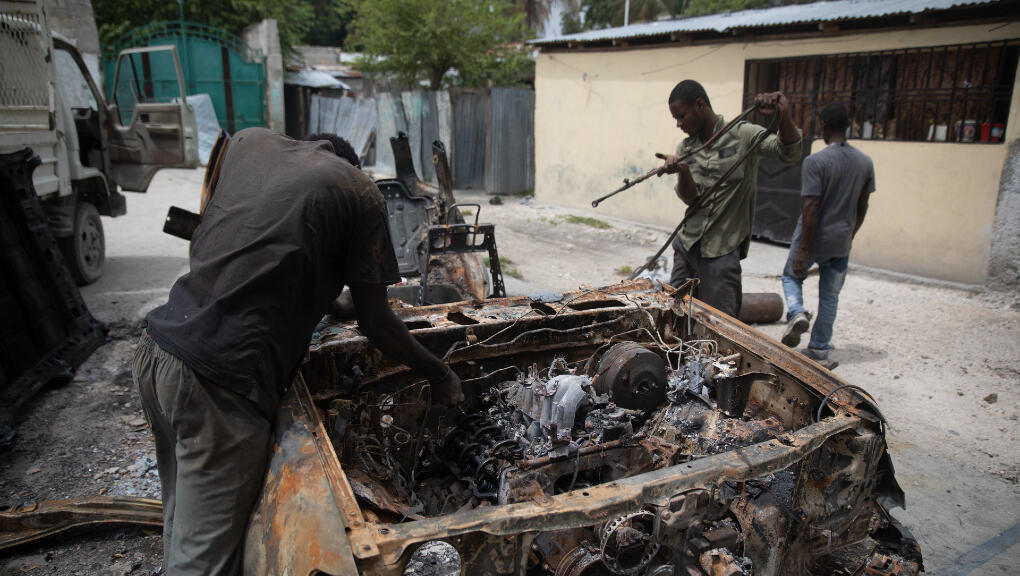One year after the assassination of Haitian President Jovenel Moïse, three conclusions are reflected: first, the investigation into his death has stalled since the first arrests; the second, the political, economic and social crisis that the country has experienced for decades has not ceased, in fact, it has intensified after Moïse’s death; and the third, insecurity has increased, marked by kidnappings and murders. Meanwhile, the international community watches without forceful actions.
On the morning of July 7, 2021, the president of Haiti, Jovenel Moïse, was assassinated in his private residence by a command of 28 alleged mercenaries, most of them Colombians.
A year later, the investigation, with an extensive dossier on what the planning, financing and execution would have been like, does not go beyond the preliminary stage; is stagnant and the most impoverished country in America is still mired in countless crises in all sectors, there is no sign of any progress, much less real international aid.
The investigation into the assassination of the president has been stalled since the first arrests of the members of the commando, hired by unknown persons, who assaulted the president’s residence. The only thing confirmed, according to the same Prosecutor’s Office, is that the command did not encounter resistance from the president’s security body. Moïse’s entourage reiterates that those responsible are still at large.
His family and the Prime Minister, Ariel Henry, have requested help from the United Nations in the investigation of the assassination, which continues without progress in who, how and why it was planned, financed and executed despite the arrests, raids and seizures.
“I live in a country where the president was killed. If something like this can happen to a president with all that security, what about me in my house? What about my children?
A year after Pres. Moïse’s murder, this is where Haiti stands:https://t.co/oqSciebYqh
— Maria Abi-Habib (@Abihabib) July 6, 2022
Martine Moïse, widow of the president, has repeatedly denounced that those responsible for her husband’s death are still at large and Henry said on his Twitter account 20 days ago that he has “the unpleasant feeling that those who conceived and financed this macabre plan are still running for the streets and are still escaping our judicial system.
Dozens of detainees, but no progress in the case
More than 40 people have been arrested for their alleged involvement in the assassination, including 18 former Colombian soldiers accused of being part of the commando that broke into Moïse’s residence to assassinate him, and who have remained in prison since then without the minimum procedural guarantees.
The relatives of the detained Colombians have expressed, on several occasions, that they do not have health or judicial guarantees since they are imprisoned. In fact, the detainees themselves denounced, in a video, the poor conditions in the prison, without eating even for three days, without water and without being able to go to the bathroom. And they asked for humanitarian aid.
Three other Colombians died in the hours after the assassination and others involved remain at large. Among those arrested is also the alleged intellectual author of the assassination, the doctor Emmanuel Sanon.
In addition, there are three other suspects involved who are being investigated by the US justice: the first of them, the Colombian ex-military Mario Antonio Palacios, who last April pleaded not guilty to the crimes charged to him by a Miami court. Palacios came to the US voluntarily after he was detained on an air layover in Panama.
The orders to commit this crime, according to investigations, were orchestrated from Florida by Haitian citizens, which is why the US Attorney’s Office has this case.
For his part, the Haitian citizen nationalized Chilean Rodolphe Jaar, arrested in January in the Dominican Republic, pleaded not guilty this Wednesday, July 6, in a federal court in Miami.
Businessman Jaar is charged with conspiracy to commit murder or kidnapping outside the United States and providing material support that resulted in Moïse’s death. If convicted, Jaar faces a maximum sentence of life in prison.
The third is former Haitian senator John Joel Joseph, extradited from Jamaica and accused of conspiring to commit murder or kidnapping outside the United States and of providing material support to the conspiracy resulting in death, reports EFE.
In addition, businessman Samir Handal, who is still in that country, was arrested 8 months ago in Turkey, also accused of conspiring to kill Moïse. Other detainees are Haitians, members of the security forces of their country.
So far, five judges have been in charge of the assassination case without making any progress.
Haiti’s political and socioeconomic crisis endures in the face of international inaction
The stagnation of this investigation process has exacerbated the crisis that the country has been experiencing for decades. Meanwhile, the international community continues to express its serious concern about the deterioration of security in the country, but without immediate action.
Jean Hénold Buteau, a professor at the State University of Haiti and spokesperson for the Alternative Socialiste party, consulted EFE, denouncing the “retrograde” nature of the actions of the international community, which, in its trial, they placed Ariel Henry in power.
The Caribbean Community (Caricom) announced that it will send a delegation to support Haiti and calls for a renewal of the United Nations mission in that country, which is carrying out its mission this July.
The Caribbean nation grapples with serious socioeconomic and political problems, plagued by violence and instability, particularly after the assassination of the president.
The president of Suriname and currently of Caricom, Chandrikapersad Santokhi, said on Tuesday, at the end of their annual summit, that he expressed “serious concern” about the deterioration of the security situation in Haiti and the prime minister -Ariel Henry- also said that his country is seeking more support and asking to start a dialogue at the national level to “build a good future for Haiti”.
Regarding the economic situation, President Moïse left a dying economy. In June 2021 Haiti had inflation of 12.5%, now inflation has doubled to 27.5%.
For the economist Enomy Germain, consulted by EFE, “today, the situation is worse than when Moïse governed. A year later, the economy has practically gone from a situation of decline to a situation of catastrophe.”
“Jovenel Moïse is no longer here, but the problems did not go away with him, the problems stayed and have even worsened,” Germain said. “The -criminal- gangs are blocking the country’s economy more than before. The issue of economic insecurity that we are experiencing is an economic ‘shock,'” he added.
Insecurity in the country: between kidnappings and murders
The situation of insecurity has been marked by the multiplication of kidnappings of Haitians and foreigners in the country and by the struggle for territory between rival gangs.

So far in 2022, more than 600 people have been kidnapped and 15 collective kidnappings have occurred in the last quarter, as reported on Thursday, June 30, by the Crime Observation Unit (COC) of the Center for Human Rights Analysis and Research. (CARDH).
In April there were 53 kidnappings and 188 in May, which represents an increase of 117%. In June there were 155 kidnappings. In the first quarter of 2022, 225 kidnappings were recorded. This represents an increase of 44.8%.
The kidnappings are mainly in Port-au-Prince, where dozens of armed gangs operate that control part of the capital.
Assassinations are also the order of the day in Haiti. In statements to EFE a month and a half ago, the Episcopal Commission for Justice and Peace of the Catholic Church in Haiti (CE-JILAP) revealed that so far in 2022 there have been more than 450 violent deaths (until May 20 ) as a result of clashes between armed gangs.
The largest number of victims, adding to this already alarming increase, occurred in the fight for territory between the rival gangs 400 Mawozo and Chen Mechan last April. Until now, the prime minister, Ariel Henry, has not been able to dialogue with the other key actors in the Haitian crisis.
The urban war that confronted these two armed gangs between April 24 and May 6, 2022 left 191 people murdered, according to the latest report by the NGO National Network for the Defense of Human Rights (RNDDH), published on Monday, July 27th.

Additionally, at least 18 women were raped, of whom 17 were subsequently executed, and 158 children were orphaned.
Of the dead, 48 were presented to the RNDDH as members or relatives of one of the armed gangs.
In other actions, “at least one of the spouses witnessed the repeated rape of his partner,” according to the report delivered by the NGO on the clashes, which began when the armed gang of 400 Mawozo attacked the Chen Mechan base in his Croix-des-Missions bastion.
Two months later, the judicial authorities have not given precise information on how the investigations into this massacre are progressing.
The situation of instability in practically all spheres in the country worsened even more after the assassination of President Jovenel Moïse, and solutions are not in sight.
With EFE and AP












Add Comment